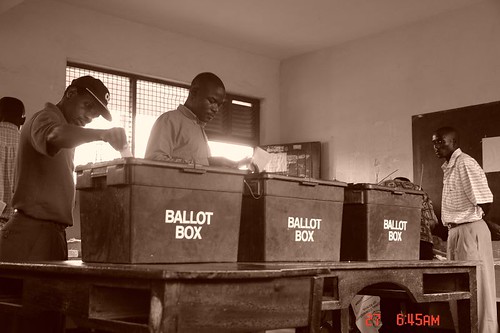Twitter has become ground zero for Kenya's flourishing disinformation industry
Originally published on Global Voices

“Kenyans Voting” by Antony Njenga is licensed under CC BY 2.0
Kenyans will head to the polls on August 9, 2022, to elect a new president, as well as members of the National Assembly and Senate, county governors, and members of the 47 county assemblies. As the general elections draw closer, fake news and politically-skewed misinformation are becoming a major problem.
Misinformation campaigns have been festering for months.
Kenya’s general elections have been held hostage twice now by fake news machinery. For instance, during the last two election cycles, Cambridge Analytica manipulated young voters by intentionally spreading fake news via social media, undermining Kenya’s democracy in the process. The campaign was revealed by the UK's broadcaster Channel 4 which covertly filmed Mark Turnbull, managing director of Cambridge Analytica Political Global, as he described the company's dominant role in Kenyan President Uhuru Kenyatta’s election campaigns in 2013 and 2017.
As some wonder whether this election will be any different, a group of current and former journalists are working to protect Kenya's information infrastructure.
During the last presidential election in 2017, the fake news machinery was deployed both at micro levels through social media influencers hired either by political parties and at a national scale through Cambridge Analytica. So why has social media continued to play such an important role in how Kenyans vote?
A flourishing disinformation industry
Social media is everything in Kenya. From a population of 54.38 million as of January 2021, there were 21.75 million internet users in Kenya, and internet penetration stood at 40 percent. While more than half of Kenya’s population still do not have access to the internet, that demographic is older populations in rural areas.
An estimated 61 percent of the nation's population is 24 years old or younger, according to the UN's 2017 estimates. This is the demographic that is most active on social media. WhatsApp and Facebook are top ranking apps by monthly active users according to the Digital 2021 Kenya report by Hootsuite and We Are Social.
As the sixth most popular platform in the country, Twitter continues to be the primary news and information trendsetter, and has become ground zero of the new flourishing disinformation industry.
In September 2021, research by two Mozilla Fellows, Odanga Madung and Brian Obilo, revealed how malicious, coordinated, and inauthentic attacks on Twitter are undermining Kenyan civil society as Kenyan journalists, judges, and other citizens are targeted through coordinated disinformation campaigns. The report also revealed how little Twitter was doing to address the issue.
While researchers contacted Twitter during the course of their study, it was only after the report had received considerable national and global coverage that Twitter took action against over 100 accounts that had violated its platform manipulation and spam policy.
In November 2021, the same Mozilla fellows released another report that revealed how hired influencers were deployed in a coordinated attack to discredit the Pandora Papers through Twitter. The papers implicated the Kenyan President Uhuru Kenyatta and his family in shady financial dealings.
An investigative feature by The Star, a Kenyan print and digital news outlet, spoke to a number of social media influencers who masquerade as political think tanks and analysts to set online agendas.
James (not his real name), an influencer who agreed to speak to The Star, said, “He [who is he?] doesn’t give a hoot about the impact of disinformation he peddles since ‘poverty is the enemy.’” He admitted to being fully aware of how the disinformation he peddles online could help stir violence, and tried to absolve himself by telling the paper that the politicians, not influencers are to blame.
“That’s my daily bread. I need money. I don’t care this is my brother whom I am tarnishing his name. At the end of the day, I need a plus one in my account,” said James to The Star.
Piga Firimbi: A new fact-checking initiative
Every five years, Kenya experiences a fake news epidemic that flows even from verified Twitter handles belonging to trusted media outlets where most news breaks.
The latest to join many of the continent’s fact-based organizations that have emerged to take on the fight is Piga Firimbi, a project by Africa Uncensored, an independent Kenyan media house set up by investigative journalists.
Piga Firimbi, Swahili for “Blow the whistle,” is a crowdsourced fact-checking service that is helping Kenyans sift through misinformation on social or mainstream media.
Ever fallen victim of fake news? If yes, here's a chance to share those fake claims with us
https://t.co/aiw7rZVFG3. Our @pigafirimbi team will sift through and give you facts only!#Saynotofakenews #Shamethefakes pic.twitter.com/bBKitpXiEO
— Africa Uncensored (@AfUncensored) January 19, 2022
Piga Firimbi joins Africa Check, one of the continent’s oldest fact-checking organizations, started in 2012, to promote accuracy in public debates and the media. There is also Pesa Check, which initially started with a focus on finances and statistics but has since diversified to cover all forms of dis-information in English, French, Kiswahili, and Amharic.
These startups have recently stepped up their efforts to counter fake news via their Twitter handles and, in the case of Africa Check and Pesa Check, a WhatsApp hotline and distribution list to grow their reach.
Though the ghosts of Cambridge Analytica will not rise to haunt voters, whether or not the efforts by these startups to crack down on fake news will pay off really boils down to whether Kenyans will take the time to verify news and information they receive/read before “forwarding as received” or not.
Post a Comment